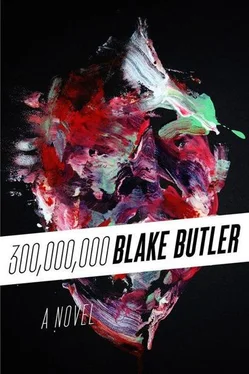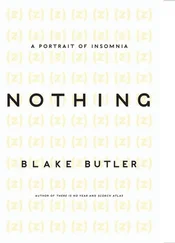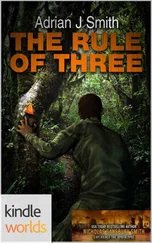BILL L., age 14: “There are no museums in this city.”
I watched from inside me and overhead while work among us warm was done. Our heat protected us. There was a ring around our house that made it look like anybody’s. Detectives with silver badges would see no air and turn away. Their bones would melt inside their hands if they came nearer. No matter how many of the boys slipped away or did themselves in, in fear of really knowing, the house held more still. Every eye led back to ours. All of the rooms were one connected, though the boys slept in the belief that they were not aging, gifted with the basked blood and the elegance into which I had enslaved them. We were growing our own film inside the house now, from the cells shucked off of foreheads or from the backs of knees. Each scene provided its own nourishment to make the next one. I did not consume water or eat beyond the victims’ bodies or the sprouts that grew up from their remainders in the locked room under the house. Sometimes I wore a headdress of their skin and sometimes gowns like a desperate princess. The smell of human leather made me erect, and I’d pinch the meatus till it disappeared into the future, for anyone to ride then. I needed every hour of me now for every mother. The boys shot my semen for me in the meantime, from our shared veins. They’d fuck anything that slept. Any flat surface. The house was coming open.
A. F. F.: “Yeah, a couple cops came sometime soon after the second set of girls. I don’t think the officers knew necessarily about what was going on but there’d been complaints about the black paint and the noise that would go on and on around the house, and the rising grasses, and man, just looking at the house, you knew. I went in the hall closet and hid and listened. I heard no talking. About an hour passed and nothing happened. I came back out slow and saw Gravey lying on the floor faceup with his mouth open. I thought he was dead but then I could see that he was laughing though no sound was coming out.”
Inside sleep I placed my own head on the machine of movies we had made or we had wished for in time recorded. As they played, they lost their color, turned monochrome and shaking without horizontal hold. From the inside looking out the days of us were in perpetual fast forward. Our song was on so many stations on the earth already and always had been, slid between the shit. Inside the muffled light of the house when I awoke again I’d have the boys come gather at a speaker each and pray in the leopard language of distortion and human vocals as gasping passage, to destroy this music, these head colds passed as hope. The paper cones vibrated with the nothing so hard, in certain frames it split my teeth; inside each tooth another field unfolding into seven where light I’d need when sundials had no one left to speak to could wait hidden. Where on the transmit span our song had not appeared yet, the other songs that came through hissed head colds into everyone we weren’t. You could hear the bodies with their wires and beef chortle feeding each other right in plainclothes and getting paid to do it. The dance palaces of black luck collapsing in no rhythm as boys and ladies rubbed themselves ready for us to want them even childless. By now none of the boys had pistons left inside them to even laugh at what so much marketable prophecy had done to all their friends, the people they had been once. I listened to them fry against the light. I loved to hear them splitting down the middle, becoming many different people, more of us. The way a body loses the self it is in the instant of the self recognizing the leaving of the self had never been more clear as in the hour of us doing absolutely nothing in between doing the worst things we could think of in America, where more air begat more air. Meanwhile, I let these boys have love. I let them taste upon me the prior mothers by the cells their bodies passed not making children yet this month, and then the cells that held within them as the making of me hard and wide inside them tried to take hold, which did not matter, as the cage was closing even still. Even in these grips of our deleted songwork, and the cower and the pinch, my boys could not itch the trigger in their blood against me and my desire to make them walk upon the earth and raise the dead. I could feel the living thoughts of every person ever vibrating in my boner, and only worse the longer they were allowed to carry on being entirely themselves. There was, for one, the house beside our house, right next door, which could be any house in America for all you know. This house, the first of many, of all of them, wore the color of the days I had not lived, days I could have lived if I were anybody else. I watched these neighbors with my mind. I could catch them in my mirrors. I stayed in one position with my fingers at my throat over a significant stretch of evenings, aiming eyes into the eye of me and memorizing where they had been already so I would know what I was going to do. I was doing all these other things at the same time too like drawing maps and baking cakes and buying stock and thinking of the day.
The best thing about planning to kill everybody in America is you can begin with anybody in America. We’d been becoming all our lives. Always our fathers had dementia whose fathers had had dementia and made our fathers with our fathers’ mothers loved our fathers and saw our fathers meet our mothers in transitory ecstasy and our mothers loved our fathers and made us in their image so that we too would do fuck and make more also. To have a mind now requires one to forget so hard even inside the perpetual familial forgetting that it now took so little crime for no crime to be distinct from all the rest, even a crime as fine as everybody in America at last at once dying, which is why it had to happen and is why I felt I had been given hands. Each object created in our image prior was a gun aimed at our forehead. Each word a hair on the finger that pulled the trigger. Each song baked into our heads so small to make room for the bigger song the band beat the shit out of with the instruments in the rooms around me, as I hawked up the liquid in which our arms and legs would be coated so that we could begin to leak the killing procedure into the cities in infestation, using every person’s arms instead of just the boys’ and mine. It would not take long to wake in where it already had been implanted. The faith that people have in people would be the very skin of the bag in which we buried our husks inside the bags of flesh we walk around in before the sun and wind and residue of all that speaking at last found us all in our eternal lack of motion there together, giving firm horizon to all this memory language and videotape, from off which we refract back into the refraction from which we’d come, beyond the edge of all possible communication, beyond reproduction.
R. A., age 22: “Something about the cream of the breath when words came out of Gravey made you want to make them happen, made you believe that what he said was really god. I never really believed in god before but if there was a god I thought it should feel like what I felt seeing the life come out of people. It was a power. We were making something of the earth’s presence. All everybody seems to want is to feel consumed with something and surrounded by something and this did that to me more than any else I’d had before. So yeah, I did whatever Darrel said but it was what I wanted too.”
And so we went unto the neighbors. The crash of night again rose shielding light against the sky for us to walk beneath unseen into the community with arms raised and faces washed. There were more of us than I could count between the mirrors, though as we surged out from the windows I realized there were less. It didn’t matter. From the light our cords contained returning to the evening made my eyes hulk in every head. Around the house a whitewash gored over the yard in the husk of moths that came to feather at the warmth our home birthed by all the flesh and homebirth. No one could see shit besides what hadn’t happened yet. Each of the boys carried long knives, which I had them select from the set of flatware in my heart according to their height: the shortest self carried the longest blade and so on unto there, where at the middle there had been the most medium of people, and the steak knife. I’d slit this middle child’s throat for being average, which seemed too real. His common blood spread on the tile and would be repackaged into little vials I would have the boys take and release into random containers of organic juice in aisles across our minor cities. For my own part I carried the weapon of my silence where the wet inside me would not end. The animals and instruments we’d lived in and believed in by memory alone and worn as skin outside our skin unfurled a silent canopy above our heads as we paraded quiet into all that old United air. I walked hid at the center of our swarm toward the neighbors singing nothing, keeping Darrel’s common brain poised in the Eye of our parade as words furled between us each to etch our presence totally common, beyond what the flanks of any municipal alarm might feel. The air I’d supplied in the boys’ minds could blow straight a dead bolt on our imaginary war. This was not hyperbole. We were the neighbors, however many miles away. The street we held our heads to was everyone’s. Their wish lived in my fingers as I pointed our way toward where was love. The current now-becoming-now was finally actually at last the instant it had always been meaning to act like.
Читать дальше












